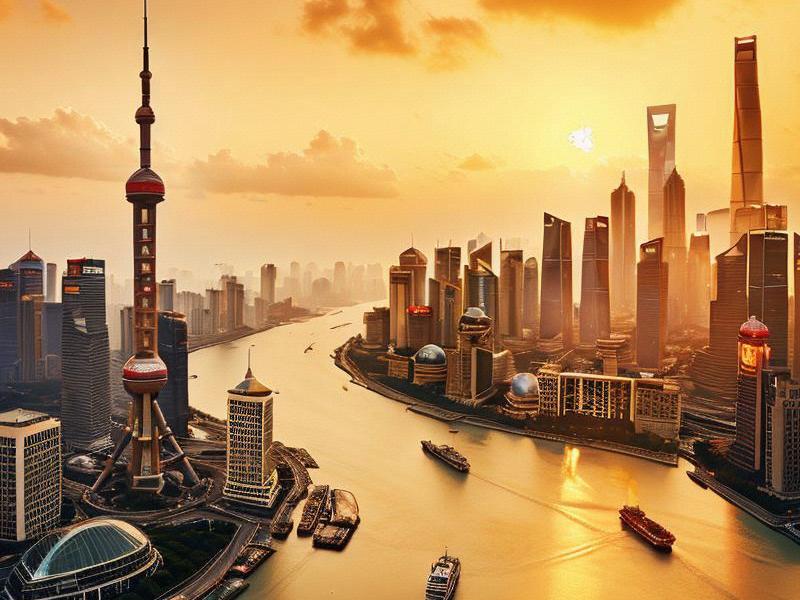
Shanghai, the largest city in China, is a city that never sleeps. Known as the "Pearl of the Orient," it stands as a testament to China's rapid modernization and its integration into the global economy. Over the past few decades, Shanghai has undergone a remarkable transformation, evolving from a historic port city into a bustling international metropolis that attracts millions of visitors and investors from around the world.
The city's strategic location at the mouth of the Yangtze River has been a key factor in its development. Shanghai's harbor, one of the busiest in the world, serves as a gateway for trade and commerce, connecting China to the rest of the globe. This maritime advantage has historically made Shanghai a hub for international trade, and today, it remains a critical node in the global supply chain.
Economically, Shanghai is a powerhouse. As one of China's four municipalities directly under the central government, it enjoys a high degree of autonomy and plays a pivotal role in the country's economic strategy. The city is home to the Shanghai Stock Exchange, one of the largest in Asia, and is a major center for finance, banking, and insurance. Its Pudong district, once a rural area, has been transformed into a futuristic skyline of skyscrapers, including the iconic Oriental Pearl Tower and the Jin Mao Tower, housing some of the world's top financial institutions.
The economic success of Shanghai is not limited to its financial sector. The city is also a leader in technology and innovation. Zhangjiang Hi-Tech Park, often referred to as "China's Silicon Valley," is a hub for research and development in fields such as biotechnology, information technology, and new materials. This focus on innovation has positioned Shanghai as a key player in China's drive towards becoming a global leader in science and technology.
爱上海最新论坛 Urban development in Shanghai is a story of contrasts. On one hand, the city boasts a modern infrastructure with state-of-the-art transportation systems, including the world's first maglev train and an extensive metro network. On the other hand, it is also committed to preserving its rich cultural heritage. The Bund, a historic waterfront area, showcases a blend of colonial architecture and modern skyscrapers, offering a glimpse into the city's past. The Yu Garden, a classical Chinese garden, provides a serene escape from the hustle and bustle of city life.
Culturally, Shanghai is a melting pot. The city has a long history of cultural exchange, influenced by Chinese, Western, and international traditions. This cultural fusion is evident in its art, cuisine, and lifestyle. Shanghai's art scene is thriving, with galleries and museums such as the Power Station of Art and the Shanghai Museum showcasing a wide range of contemporary and traditional art forms. The city's culinary scene is equally diverse, offering everything from traditional Shanghainese dishes like xiaolongbao (soup dumplings) to international cuisines.
Shanghai's role on the world stage is becoming increasingly significant. It is a member of the World Expo and has hosted major international events such as the APEC Leaders' Summit and the G20 Summit. These events have highlighted Shanghai's ability to host large-scale international gatherings and its commitment to global cooperation.
However, the rapid development of Shanghai has not been without challenges. The city faces issues such as air pollution, traffic congestion, and housing shortages. The government has implemented various measures to address these concerns, including promoting green initiatives, improving public transportation, and developing affordable housing projects.
419上海龙凤网 One of the most ambitious projects in Shanghai is the construction of the Hongqiao Comprehensive Transportation Hub, which aims to integrate air, rail, metro, and bus services into a single facility. This project reflects the city's commitment to enhancing connectivity and reducing environmental impact.
In addition to economic and urban development, Shanghai is also focusing on sustainability. The city has set ambitious goals to reduce carbon emissions and promote renewable energy. Initiatives such as the installation of solar panels on buildings and the development of electric vehicle charging infrastructure are part of Shanghai's strategy to become a more sustainable city.
Education is another area where Shanghai excels. The city is home to some of China's top universities, including Fudan University and Tongji University, which attract students from around the world. Shanghai's education system is known for its emphasis on science, technology, engineering, and mathematics (STEM), preparing students for the challenges of the future.
上海贵族宝贝sh1314 Tourism is a significant contributor to Shanghai's economy. The city offers a wide range of attractions, from historical sites like the Old City God Temple to modern landmarks like the Shanghai Tower, the tallest building in China. The city's vibrant nightlife, shopping districts, and cultural festivals make it a popular destination for both domestic and international tourists.
Shanghai's transformation is not just about economic growth; it is also about improving the quality of life for its residents. The city has invested heavily in public services, including healthcare, education, and social welfare. Initiatives such as the expansion of public housing and the improvement of urban green spaces aim to crteeaa more livable and sustainable environment.
In conclusion, Shanghai is a city of contrasts and opportunities. Its rapid development has made it a global economic hub, a cultural melting pot, and a model for urban sustainability. As Shanghai continues to evolve, it faces the challenge of balancing economic growth with environmental and social considerations. The city's ability to adapt and innovate will be crucial in shaping its future and maintaining its position as a leading global metropolis.
